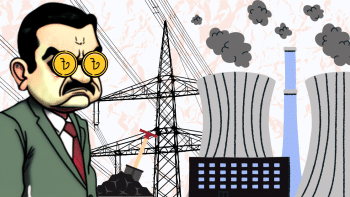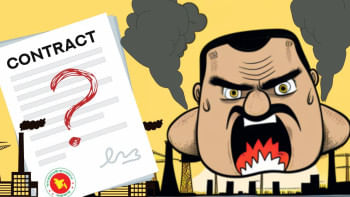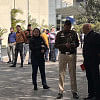Why the raid at BBC offices in India should worry us all

The Indian income tax department's sudden raids at the BBC offices in New Delhi and Mumbai have drawn widespread condemnation against the government of Prime Minister Narendra Modi. It has shocked journalists, activists, and opposition politicians alike. Such a high-handed action against one of the oldest and most trusted global broadcasting networks will understandably be a cause for concern and discomfort in Western capitals, as well as those in every democratic country.
The raids, which the income tax officials have described as "surveys," follows the recent controversy over the BBC's showing of a two-part investigative documentary, titled India: The Modi Question, which for the first time revealed a confidential investigation by the British government into the 2002 Gujarat riots that left more than a thousand Muslims dead. The investigation report concluded that the violence had "all the hallmarks of genocide" and found Modi "directly responsible" for not stopping the killings of Muslims.
The BBC didn't air the documentary in India or anywhere else except the UK and did not explain the reasons for such restricted dissemination. But that didn't help the agency to shield itself from the wrath of the government of the Hindu nationalist Bharatiya Janata Party (BJP). The Indian government used its emergency powers under the Information Technology Rules to block YouTube videos and social media posts sharing links to the documentary, and slammed the documentary as "hostile propaganda and anti-India garbage." Besides the government's invoking of emergency law to stop its showing in India, some right-wing groups associated with Hindutva politics petitioned the Supreme Court, seeking a complete ban on the BBC in India over the documentary, which the court has declined, calling the petition "entirely misconceived."
All these official and unofficial acts were a warning signal for what would ultimately follow.
The tax officials' attempt to disguise the raids as surveys wasn't helped either by the comment of the BJP spokesman Gaurav Bhatia, who described the BBC as the "most corrupt organisation in the world." He said, "India is a country which gives an opportunity to every organisation, as long as you don't spew venom." His explanation that the searches were lawful and the timing had nothing to do with the government failed to mask his party's vengeance against a news organisation that they now characterise as "anti-Indian."

Opposition leaders were quick to protest the raids. Congress leader Jairam Ramesh said, "Here we are asking for a Joint Parliamentary Committee (JPC) probe into the Adani-Hindenburg row, and there the government is hounding the BBC." Leaders of Samajwadi Party, Trinamool Congress, and other regional parties have condemned the raids and called them an act of desperation.
Rights group Amnesty International, which was forced to stop its operation in India following its accounts being frozen by another government agency, said, "Overbroad powers of the Income Tax Department are repeatedly being weaponised to silence dissent." Tax raids have been carried out on Oxfam and several think tanks, too, for carrying their critical roles against some government policies.
The top professional body that guides journalism in India, the Editors Guild of India (EGI), expressed its concerns saying it was "distressed by the continuing trend of government agencies being used to intimidate and harass news organisations that are critical of (the) ruling establishment." It listed similar surveys by tax officials at the offices of NewsClick and Newslaundry in September 2021, at Dainik Bhaskar and Bharat Samachar in June 2021, and raids conducted by another agency, the Directorate of Enforcement, at the office of NewsClick in February 2021. The EGI noted that in each case, the raids were against the backdrop of critical coverage of government agencies by the news organisations.
The Press Club of India described the "surveys" as part of a series of attacks on the media by the Indian government in recent times. It said that this latest instance appeared to be a clear-cut case of vendetta. And that such actions against an international broadcasting network will damage the reputation and image of India as the largest democracy in the world.
What is even more disturbing is the seizure of laptops and mobile phones of journalists working there. As the raids continue for the third day on February 16, people have been expressing their concerns and anger in real time on social media platforms. MK Venu, founding editor of The Wire, asked in a tweet whether due process was followed in seizing phones, reminding that the Supreme Court of India in a separate case made some observations about searching phones. Karishma Mehrotra, a correspondent of The Washington Post, termed seizing journalists' phones "stunning and apparently retaliatory."
Some leading Indian newspapers including the Indian Express and Hindustan Times ran special explainers outlining the differences between tax raids and surveys. Quoting the Income Tax Act, they said tax officials cannot seize any books of accounts, cash, and documents during the course of the surveys, but in searches such actions are permitted. Whatever official narrative is given, there's no doubt that this latest episode will be seen as a dangerous attack on press freedom and a slide into authoritarianism.
The global advocacy group on media freedom, Reporters Without Borders (RSF), said that press freedom in India had deteriorated since Modi came to power. India now ranks 150th out of 180 countries in its World Press Freedom Index, which is a historical low for a nation that regularly takes pride as the world's largest democracy. India's worsening media environment is a matter of concern in other countries too, particularly in its neighbourhood, as other leaders frequently emulate experiences of an aspiring superpower. As India holds the presidency of the G20 nations and promises to set an alternative course to the current world order, its slide into authoritarianism and dictatorship should worry us all.
However, many observers express their frustrations over the international community's inaction due to geostrategic and economic considerations. The Western powers' need for a powerful ally to counter China's increasing global influence means there is little appetite in Western countries to confront India's current Hindu nationalists on the crucial issues of human rights, freedom of press, and weakening of democracy.
Kamal Ahmed is an independent journalist. His Twitter handle is @ahmedka1

 For all latest news, follow The Daily Star's Google News channel.
For all latest news, follow The Daily Star's Google News channel. 









Comments